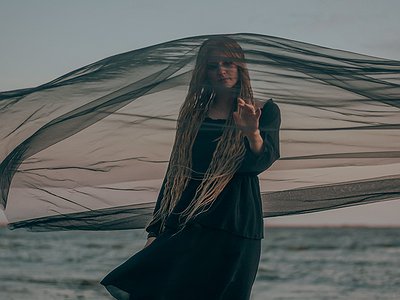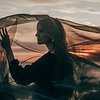Name: Mariana Semkina
Occupation: Songwriter, vocalist, lyricist
Nationality: Russian
Current release: Mariana Semkina's Disillusioned EP is out on 1st October.
Recommendations: Oh I can make such a list here (laughs)! It's hard to pick one when you have so many favourites but I guess I'll go with my very favourite painting, Ophelia by John Everett Millais. It's a gorgeous work of art by one of the founding Pre-Raphaelite Brotherhood members that changed British Art like no one else. It depicts drowning Ophelia as she draws her last breath and there's such a beautiful story connected with this painting. The model for it was Elizabeth Siddal, a wonderful tender soul who was also an aspiring artist and a poet. She was posing for this painting in a bath filled with water that was kept warm with the candles placed under it but as Millais kept working they went out and the water got freezing cold - and she didn't say a word cause she didn't want to interrupt the process. Unfortunately this resulted in her becoming terribly ill and the urban legend of this painting says that she died but that's not true; she died years later (when she was only 33 still) of laudanum overdose. But it is true that after this incident with cold bath her heath was never the same, or so they say. I actually live very close to where she went to improve her health in East Sussex.
Second one would probably be a wonderful book, one of my favourites from recent years, Little Life by Hanya Yanagihara. Heart shattering work, it's huge but I couldn't keep my hands off it when I was reading it and I wish I could undo that and read it all over again!
If you enjoyed this interview with Mariana Semkina, visit her on Instagram, Facebook and twitter to stay up to date on her work. She also has a Patreon page which allows you to support her directly.
Or visit the bandcamp page of her band Iamthemorning.
When did you start writing/producing music - and what or who were your early passions and influences? What what is about music and/or sound that drew you to it?
I've been brought up in a weird household. My parents were rather creative and there was always music playing but at the same time they refused to send me to a music school for a number of excuses so I ended up sneaking out to school band rehearsals without telling them about it. Come think of it, maybe it was a part of my teenage rebellion.
I guess the fact that I was always surrounded by music played a big part. The hostile environment in school made me turn to art more and more - I've been bullied for a solid ten years while in school so music and literature were my best friends. And when you end up with a trauma you can't shake off, it finds ways of manifesting itself and I think I got lucky. It could have been much worse.
For most artists, originality is first preceded by a phase of learning and, often, emulating others. What was this like for you? How would you describe your own development as an artist and the transition towards your own voice? What is the the relationship between copying, learning and your own creativity?
There wasn't really a specific moment or a role model that made me who I am. It all shaped organically as a result of my upbringing, the challenges I was facing and interests I developed early on. So it's not really a particular band I was listening to that shaped me but the challenges I faced as a person to get out there and get a better life, all the art and history that I studied, all the places I traveled to and books I read. I guess maybe I can't pin down that particular period of my life when I might have been learning for other musicians because I never saw myself as one. Yes, I was making music and writing songs and singing but I was always surrounded by people superior to me so I never really took myself seriously … and then I discovered that others do.
It was a very organic process - I started writing songs the moment I found someone who could actually play well enough to improvise and accompany me, that was when I was 17. I never questioned why I'm doing it or what my plans and ambitions are - even when we recorded the first album with Iamthemorning it was mainly for the sake of getting some closure and starting writing new material. We never dreamed of being heard outside of our little circle of fans in Russia.
What were your main compositional- and production-challenges in the beginning and how have they changed over time?
I think songwriting is a skill like anything else. You learn it and spend every day developing it and just as any other skill it goes away if you don't do it enough. I am still learning of course but I think the more you do it the easier it gets - not just because you've "developed" that skill but also psychologically. I've been told a lot that I'm not good enough and when you repeat something often you start to believe it so it took some time for me to gather my own footing and trust that I even have a right to stand on my own. It's kind of a sad story (laughs).
Production-wise things of course got much better as my music projects grew and I could afford better gear. Even though I'm not at all obsessed with quality it is still nice to make nice sounding demos and even record at home as opposed to a pricey music studio because having a home recording studio frees you in many ways. I still remember the days when I wrote songs and recorded them using my basic concert Shure mic that someone gave me cause they had a spare one and a very old Fast Track card - the quality was pitiful but there was a certain charm in it. I never let the lack of "gloss" stop me from writing.
What was your first studio like? How and for what reasons has your set-up evolved over the years and what are currently some of the most important pieces of gear for you?
As I mentioned, I was never obsessed with the quality of sound. For a very long time I recorded all of my demos in an extremely lofi manner, sometimes even using an iphone microphone. I also remember having night shifts in the office (i work for an IT company) and recording songs using the regular team speak mic into audacity I installed on my office desktop. It was never a big deal, my main principle remains the same - if you're inspired and want to write, write no matter what. If the idea is there, you'll be able to improve it, it's like writing something in pencil. Barely visible but there and is able to grow and develop into something substantial - and much better than abandoning a good idea just because you don't have immediate means of capturing it.
Of course over the years of working in amazing studios I got a bit spoiled and I try to keep all of my recording gear at hand for instant use when I feel like it (setting things up can be such a buzz killer). I use a U47 replica (not a direct clone but it's a large diaphragm valve mic modified to put it in a similar family as a Neumann U47, it was made by FoxElectronics in USA and kindly lent to me by a friend), Steinberg ur12 and Logic as my main DAW even though sometimes when I'm on the go I bring my mobile recording setup which is an ipad with Garage Band and an iRig with Shure beta 57, but that hasn't happened in the past year for obvious reasons.
How do you make use of technology? In terms of the feedback mechanism between technology and creativity, what do humans excel at, what do machines excel at?
I'm not that big of a technology nerd to be honest. I'm getting what I need out of it but most of the time it's capturing the basic idea, and after that I turn to the brilliant minds of people I work with on a production. I always thought that it's dangerous for musicians to rely on technology too much - even though sometimes it's inevitable. Especially in the live setting. One of the things in Iamthemorning that makes me proud is that no matter what, come rain and thunder, we'll be able to play and sound just as good (or even better) than on our albums. Technology failed us on stage more than once (from laptop crashing to energy in the venue going off) and we found a way around it because with us the core of everything we do is the good old fashioned musicianship.
Production tools, from instruments to complex software environments, contribute to the compositional process. How does this manifest itself in your work? Can you describe the co-authorship between yourself and your tools?
I haven't really been using technology for writing much although during the last half a year after moving to England and finally settling down I upgraded my studio and got an electric guitar which also made me dive into the world of guitar plugins.
At the moment I'm totally addicted to Neural DSP products. For someone who wrote using acoustic guitar for years getting so much freedom of expression with the variety of plugins they have is amazing. I'm no guitarist but it's always a pleasure to listen to something beautiful when you're writing and their products inspired me to write a lot just because of how fresh and new this sounds to me.
Collaborations can take on many forms. What role do they play in your approach and what are your preferred ways of engaging with other creatives through, for example, file sharing, jamming or just talking about ideas?
There's nothing quite like getting in the room together with people you're going to make an album with but that's happening less and less sadly, the work process migrated almost entirely into the digital world.
Collaborations are what I love most about music but I do pick my collaborators very carefully. I not only look at their musical skills but also their efficiency -- too many times I've been let down by people with wonderful talents but zero discipline or questionable work ethics. Writing together creates a very special chemistry and I'm pouring so much of myself into everything I do. There's nothing more anti-climatic than musical material that sounds great but never comes to its final form because of the other party taking part in it. Nothing quite as sad as wasted potential.
I am often surprised by myself when it comes to collaborations. I learn new things about myself as a musician working with people that make music much different from mine, and I think it's a great learning experience. I guess it makes me leave my comfort zone and I'm always up for that cause it always teaches you something. So I'd love to try on a lot of different genres and I'm working in this direction.



